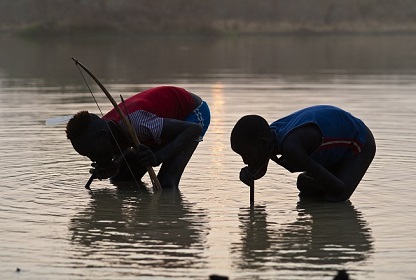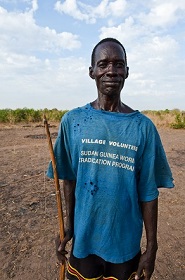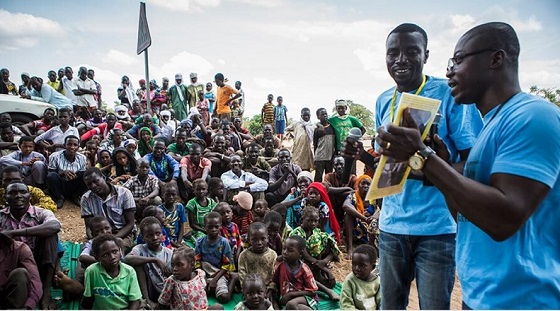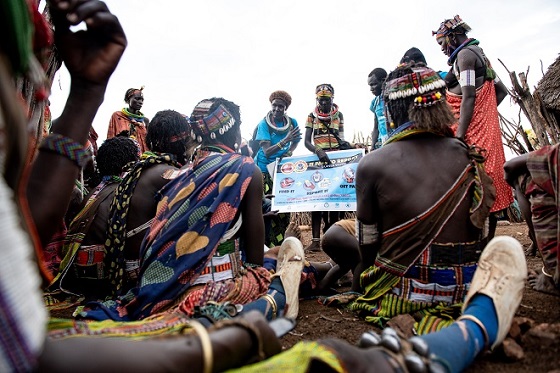The Fourth Hideyo Noguchi Africa Prize (Medical Services) - PRESS RELEASE -August 3, 2022, Japan The Cabinet Office
The Government of Japan has decided to award the Fourth Hideyo Noguchi Africa Prize to Drs. Salim S. Abdool Karim and Quarraisha Abdool Karim (RSA) for Medical Research Category, and Guinea Worm Eradication Program for Medical Services Category (The Carter Center in partnership with all stakeholders in Africa).
Medical Services Category
Guinea Worm Eradication Program
 A global campaign, led by The Carter Center in partnership with stakeholders in Africa, to eradicate the second human disease in history.
A global campaign, led by The Carter Center in partnership with stakeholders in Africa, to eradicate the second human disease in history.
(Photo Credit: The Carter Center / L. Gubb)
Displacement by war and nomadic lifestyles in South Sudan make pipe filters – distributed to men, women, and children – an important tool against contracting Guinea worm disease.
Kuse Dam, Terekeka County, South Sudan
The Fourth Hideyo Noguchi Africa Prize for Medical Services goes to the Guinea Worm Eradication Program for the near eradication of Guinea worm disease, led by The Carter Center and carried out in partnership with ministries of health in Africa, communities, nongovernmental organizations, and key partners like the World Health Organization (WHO) and the U.S. Centers for Disease Control and Prevention (CDC).
The Guinea Worm Eradication Program deserves to be awarded the Fourth Hideyo Noguchi Africa Prize in the Medical Services category. The Carter Center began leading the global campaign in 1986, and, today, together with partners, works to erase the scourge of this debilitating disease. The parasitic disease is spread by consuming contaminated drinking water and can be tackled with community education, water filtration and, in cases of existing infection, proper treatment. There is no vaccine or drug to treat or prevent Guinea worm disease, only behavior modification and building trust at the community level. But achieving eradication continues to require reaching remote locations, tackling conflict zones, and reinforcing a vast infrastructure of local public health and sanitation workers across the African continent. It was a bold idea in the 1980s to target Guinea worm disease for eradication, but not a simple one. It would require ongoing funding and decades of commitment. By 2021 the burden of Guinea worm disease had fallen from an estimated 3.5 million cases annually to a mere 15 – with more than 80 million human cases averted. Yet, access to safe water in these remaining and at risk communities continues to remain paramount, especially as animal transmission has been identified in targeted areas. The HNAP Committee congratulates The Carter Center and all the stakeholders who have been involved in the Guinea Worm Eradication Program at communal, regional, national, and international levels for its extraordinary achievements and the near eradication of the second human disease. Together we will remain tenaciously vigilant to ensure that this ancient disease is relegated to the history books.
Summary of Achievements
Working closely with ministries of health and local communities in Africa and Asia, the Guinea Worm Eradication Program, a global coalition led by The Carter Center, has reduced cases by more than 99.99% from approximately 3.5 million in 1986 to just 15, all in Africa, in 2021.
The presence of Guinea worm disease in an area usually indicates abject poverty, including lack of safe drinking water. Guinea worm disease, or dracunculiasis, is a water-borne parasitic disease that causes tremendous suffering yet is completely preventable. Emerging worms can incapacitate people and their families for weeks, even months. Guinea worm disease is contracted when water contaminated with tiny water fleas that harbor Guinea worm (Dracunculus medinensis) larvae is consumed. About a year after ingestion, a mature Guinea worm creates an agonizingly painful lesion and slowly emerges from the body through the skin. Infected persons may try to seek relief from the burning pain and immerse the lesion in water, which allows the worm to release its larvae into the water and begin the disease cycle all over again.
In 1986, an estimated 3.5 million Guinea worm disease cases occurred annually in 19 countries in Africa and two in Asia, and some 120 million people were at risk of infection. The ancient disease is being eliminated through community-based interventions to educate people to change their behavior to interrupt the transmission. In each country, the national program is implemented by the ministry of health in partnership with national and local political leaders, nongovernmental organizations, as well as traditional leaders and community-based village volunteers. Filters are provided and people are taught to filter all drinking water, and volunteers are trained to teach prevention practices to their communities, recognize the signs of an emerging Guinea worm, and provide free treatment. Cash rewards are paid so that suspected cases are quickly reported and can be contained.
As a result of these continuing efforts by the Guinea Worm Eradication Program, today the disease persists only in the most complex and remote locations in a handful of countries in Africa. According to The Carter Center, the total human case count from 1 January to 31 December 2021 was only 15. This impressive result opens the possibility of Guinea worm becoming the first parasite, and the second human disease (after smallpox) to be eradicated in history.

Community-based village volunteers are the frontline heroes of the Guinea Worm Eradication campaign) and their dedication and commitment are responsible for the progress: 99.99% eliminated worldwide. Molujore village, Terekeka County, South Sudan
(Photo credit: The Carter Center/L. Gubb)

Carter Center technical advisor Laurès Dossou (foreground) and volunteer supervisor Mende Kelmane Alphonso instruct a crowd on how to detect Guinea worm disease during a cash rewards ceremony in Dangabol Village, Chad. People who report suspected Guinea worm infections and take appropriate measures can receive rewards of up to $100
(Photo Credit: The Carter Center/J. Hahn)

Community health workers, Regina Natube, Morris Abure and Lokore Arkangelo of the Guineaworm Eradication programme talk to villagers in Akoruni village about the cash reward initiative, Republic of South Sudan
(Photo Credit: The Carter Center/C. Marin)
